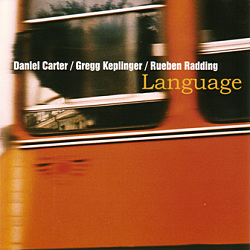MUSIC REVIEW BY Derek Taylor, One Final Note
As far as populist-minded musicians go, Daniel Carter ranks among the most resolute. From the subway-centric guerilla music tactics of Test to continuing collaborations with regional stalwarts like Jonathan LaMaster, Carter has lent his horns to a diverse array of creative improvisation causes. Echoing the old television Western hero Paladin, it's a case of have guns (or in this case horns) will travel. On this date for the Seattle-based Origin imprint he carves another notch in his figurative gun belt and only uses his alto to get the job done. Rueben Radding may spark some recognition from his former role as anchor and auteur in Myth Science, a Downtown NYC ensemble dedicated to resuscitating the works of Sun Ra through a groove-hued lens. He's since relocated to the dank environs of the Pacific Northwest and this current forum is more indicative of his substantial faculties on the strings. Greg Keplinger, a self-professed Elvin Jones fanatic, forms a competent third point of the triangle.
A relentless torrent of split arco lines douses the ears on "Speak Glow", as Radding works his strings into a stringent lather with scrubbing bow. Carter enters on hoary alto, building a poetic sermon with sure-footed deliberation from the ground up, only to abruptly drop into silence. Keplinger seizes the moment and dives into a drum break of dramatic, but exacting density. Suddenly Carter's back, jabbing and puncturing the air and it becomes easy to imagine the see-sawing body movements that are no doubt accompanying his aural exhortations in the visual sphere. The title track is a different beast altogether. Starting slowly, the three players languish in a lush pillowy setting that quickly grows ominous spines by way of Radding's bowed harmonics. It's an uneasy mix of the delicately lyrical and the decidedly sinister that ultimately works on the strength of equilibrium achieved. The bassist picks his notes in a manner of supreme confidence, mapping a grid of figures filled with space and gravity. While the piece meanders in places and seems ill-suited to its girth at times, Carter's horn serves as able compass in guiding the group to safe and substantial waters. "Aphasia" is far from the transitional piece its brevity might imply, and the three players pack a bounty of energy into the relatively constricted space. "Never on Sunday" takes an opposite tack, stretching out with a sensuous romanticism that soothes the senses and shows Carter's gentle side. Radding and Keplinger contribute as much to the mellow, cerulean mood, playing with both economy and purpose over the extended improvisation. "Roadrunner" reignites the ecstatic engines and the three players ride off into silence on a shared high energy steed.
Through the lead role of his instrument and the strength of his charismatic delivery, Carter seems the focal point for much of the action on this outing. But more detailed listening reveals that the three men are sharing almost equally in the endeavor. Radding and Keplinger represent their region, one not usually designated as a creative improvised music scene, with a skill and consistency that is likely to silence critics and recruit legions of admirers.
A relentless torrent of split arco lines douses the ears on "Speak Glow", as Radding works his strings into a stringent lather with scrubbing bow. Carter enters on hoary alto, building a poetic sermon with sure-footed deliberation from the ground up, only to abruptly drop into silence. Keplinger seizes the moment and dives into a drum break of dramatic, but exacting density. Suddenly Carter's back, jabbing and puncturing the air and it becomes easy to imagine the see-sawing body movements that are no doubt accompanying his aural exhortations in the visual sphere. The title track is a different beast altogether. Starting slowly, the three players languish in a lush pillowy setting that quickly grows ominous spines by way of Radding's bowed harmonics. It's an uneasy mix of the delicately lyrical and the decidedly sinister that ultimately works on the strength of equilibrium achieved. The bassist picks his notes in a manner of supreme confidence, mapping a grid of figures filled with space and gravity. While the piece meanders in places and seems ill-suited to its girth at times, Carter's horn serves as able compass in guiding the group to safe and substantial waters. "Aphasia" is far from the transitional piece its brevity might imply, and the three players pack a bounty of energy into the relatively constricted space. "Never on Sunday" takes an opposite tack, stretching out with a sensuous romanticism that soothes the senses and shows Carter's gentle side. Radding and Keplinger contribute as much to the mellow, cerulean mood, playing with both economy and purpose over the extended improvisation. "Roadrunner" reignites the ecstatic engines and the three players ride off into silence on a shared high energy steed.
Through the lead role of his instrument and the strength of his charismatic delivery, Carter seems the focal point for much of the action on this outing. But more detailed listening reveals that the three men are sharing almost equally in the endeavor. Radding and Keplinger represent their region, one not usually designated as a creative improvised music scene, with a skill and consistency that is likely to silence critics and recruit legions of admirers.
Soundclips
Other Reviews of
"Language":
Expose by Jon Davis
Jazz Times by Aaron Steinberg
Jazz Now by Michael Bettine
All Music Guide by Scott Yanow
Jazz Review by Mark E. Gallo
JazzTimes, May 2003 by Aaron Steinberg
All About Jazz by Dave Nathan
